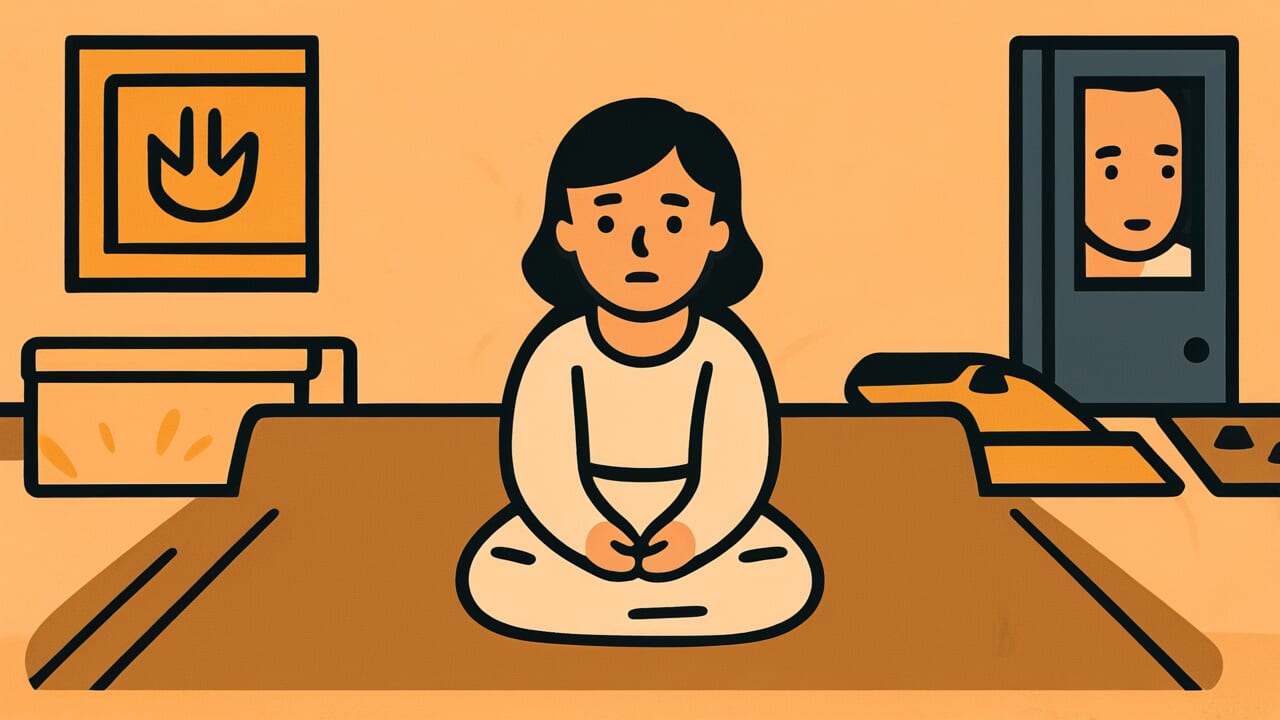How to Read “Hell and paradise are in the heart”
Jigoku gokuraku wa kokoro ni ari
Meaning of “Hell and paradise are in the heart”
This proverb means that happiness and unhappiness depend on how you hold your mind. Even when placed in the same situation, whether you feel it as hell or paradise changes based on your state of mind.
For example, on a rainy day, some people feel gloomy while others rejoice at the blessed rain. Some people see busy work as painful, while others feel fulfilled by it.
This proverb teaches that your inner attitude toward events matters more than the external environment or events themselves.
Today, people sometimes express this idea as positive thinking. But this proverb holds a deeper meaning.
It’s not just about thinking optimistically. It teaches the importance of organizing your mind and developing the ability to see the true nature of things.
Origin and Etymology
The origin of this proverb is thought to be strongly influenced by Buddhist philosophy. In Buddhism, hell and paradise are explained not just as places you go after death, but also as states of mind in this present world.
Zen Buddhism especially emphasizes the idea that “the mind creates hell, and the mind creates paradise.” This philosophy states that your state of mind toward situations, not the external situations themselves, divides suffering from happiness.
The recorded sayings of Chinese Zen monks also contain many words showing similar ideas. As Zen was transmitted to Japan, these teachings likely combined with Japanese sensibilities and became established as a proverb.
What’s interesting is that this proverb hasn’t remained just a religious doctrine. It has been widely accepted as practical life wisdom.
Rather than being a specialized Buddhist teaching, it expresses a universal truth that everyone experiences: “the same event feels different depending on your perspective.”
By expressing this through the contrasting words of hell and paradise, it gained people’s sympathy. During the Edo period, it was apparently used in common education to teach the importance of one’s mental attitude.
Usage Examples
- I lost my job, but since hell and paradise are in the heart, I’ll think of this as a chance to try something new
- She never loses her smile in any difficult situation—she truly embodies hell and paradise are in the heart
Universal Wisdom
Humans have questioned what happiness is since ancient times. Many people believe they’ll be happy if they gain wealth, status, or fame, and they work hard toward these goals.
Yet some people who obtain everything still feel unfulfilled, while others find deep joy in simple living. This contradiction is likely the background from which this proverb was born.
The human mind has a mysterious quality. Looking at the same half-filled glass, one person laments “only half left” while another rejoices “still half remaining.”
This difference arises independently of the objective fact of the water’s amount. In other words, much of the happiness and unhappiness we feel is determined not by reality itself, but by how our minds interpret reality.
This proverb has been passed down through generations perhaps because humans are creatures who tend to seek happiness outside themselves.
We think we’ll be satisfied if we obtain something, and we believe we’ll be happy if our environment changes.
But our ancestors saw through the fact that pursuing external conditions has no limit. True peace can only be gained by organizing your own mind.
This deep insight has been inherited across the ages.
When AI Hears This
The brain isn’t a camera that simply reflects the outside world. It constantly predicts “what comes next” and processes only the error between that prediction and actual input.
This is predictive coding theory. For example, when studying in a noisy café, you stop noticing the noise once you get used to it.
This happens because the brain creates a predictive model that “this environment makes these sounds” and stops bringing predicted sounds to consciousness.
Here’s a surprising discovery. Since the brain’s predictive models are built from past experience, the same stimulus produces completely different reactions in different people.
One study showed that when viewing the same neutral facial expression, people with high anxiety predicted “anger,” their amygdala activated, and they actually felt fear.
In other words, the objective situation is identical, but depending on the brain’s predictive model, it becomes either hell or paradise.
What’s more important is that these predictive models aren’t fixed. Research proves that meditation and counseling can change predictive habits.
Even in the same crowded train situation, a brain predicting “hell of being crushed by others” versus a brain predicting “companions all working hard to commute” actually produces different amounts of stress hormones.
Hell and paradise are truly created within the heart—the brain’s predictive system.
Lessons for Today
Modern society may place too much emphasis on arranging external conditions. Seeking better jobs, higher income, and more comfortable environments is important, but that alone won’t bring true satisfaction.
What this proverb teaches is that you yourself hold the key to happiness. Crowded commuter trains can become reading time if you change your perspective.
Daily life that seems monotonous becomes a treasure trove if you have a mind that seeks small discoveries.
When facing difficult situations, whether you see them as growth opportunities or merely lament them as bad luck will greatly change your life afterward.
Of course, you don’t need to force yourself to think positively. What matters is noticing your mental state and knowing you can choose it.
Even while acknowledging that painful times are painful, just knowing there’s room to find meaning in them can change your quality of life.
Your heart is something you cultivate yourself.



Comments